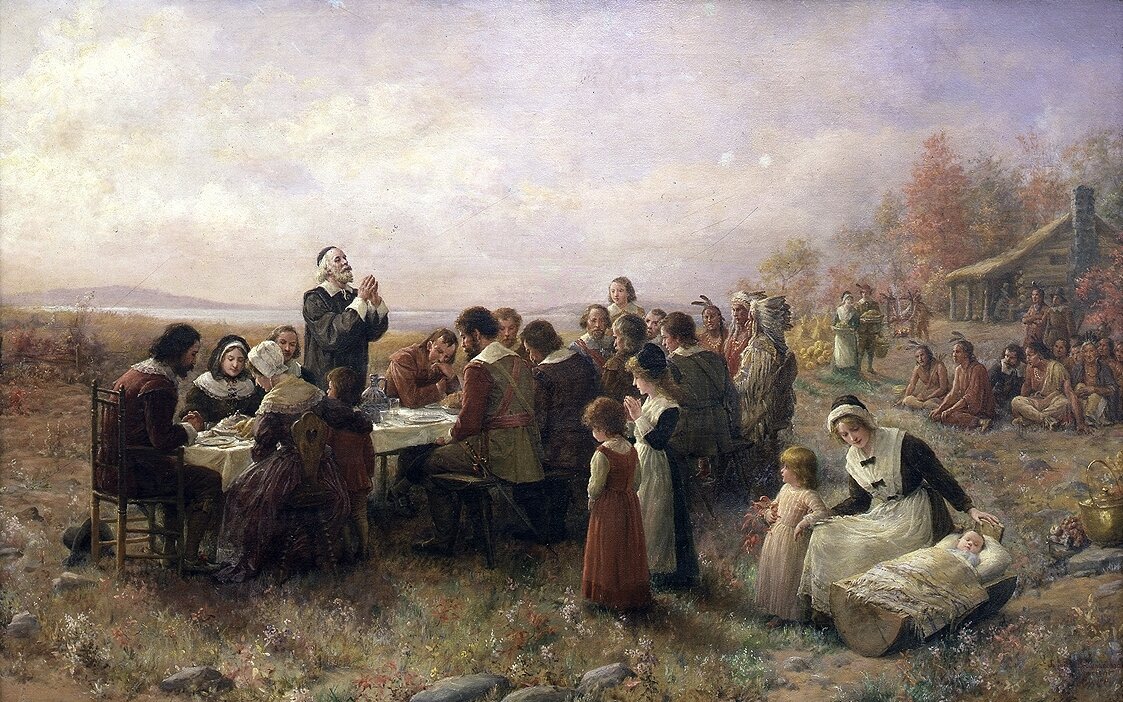22 November 2020
Thanksgiving is a North American holiday celebrated in the autumn. In the United States, it commemorates an October 1621 celebration by the settler-colonists of Plymouth in what is now Massachusetts for surviving their first year. The “First Thanksgiving,” a name retroactively applied to the event, was multi-day harvest festival attended by the settler-colonists and a number of Wampanoag Indians. There also was an earlier 1619 thanksgiving celebration in Virginia which has been largely ignored by popular histories.
The etymology is quite obvious, the compounding of thanks + giving, that is a holiday ostensibly dedicated to prayers to the divine. The concept, which is that of a harvest festival, if not the name, can be found in cultures worldwide. For those few unfamiliar with the North American tradition, in its modern incarnation it involves a gathering of family and friends and a turkey dinner, with stuffing, mashed potatoes, yams, assorted vegetables, pumpkin pie, and, if you’re from Baltimore, sauerkraut.
The Thanksgiving holiday was celebrated intermittently and usually unofficially until 1870, especially in New England, the most famous instance being Abraham Lincoln’s wartime proclamation of a holiday of “Thanksgiving and Praise” in November 1863. In 1870 the holiday was made permanent, although the date has varied over the years. Since 1941 it has been celebrated on the fourth Thursday in November.
As in United States, early celebrations of Thanksgiving in Canada were unofficial and intermittent until 1879, when the holiday was made permanent and official. At first, it was celebrated in early November, but in 1957 the holiday was moved to the second Monday in October to avoid conflict with Armistice Day and having two holidays in one week.
Canadian Thanksgiving is sometimes said to date to 1578 when Martin Frobisher’s expedition in search of a Northwest Passage celebrated a communion service in thanks of being delivered from the perils of the ice, but this would seem to be a retrofitting of an obscure and minor event to find a historical justification for the holiday, especially a justification that one-ups the United States in terms of precedent.
The word’s history, however, is older than the North American holiday. The word thanksgiving, in the sense of a general giving of thanks to God, dates to at least 1533 when William Tyndale uses it in his tract The Souper of the Lorde:
And for this so incomparable benefyt of oure redempcio[n] (whiche were solde bondmen to synne) to gyue thankis vnto God the father for so mercyfull a delyuerance thorowe the deathe of Iesu Cryste, euery one, some synginge and some saynge deuoutely, some or other psalme or prayer of thankes geuinge in the mother tonge.
The use of thanksgiving to denote a public celebration can be found as early as 1641, when Edward Nicholas, an English government official, makes reference to such in celebration of an agreement between England and Scotland:
And att a conference of both houses it was resolved that there shalbe on ye 7th of September next a publique thanksgiving for this good accord betweene ye 2 nacions.
As mentioned, the original Plymouth settler-colonists did not refer to their celebration as Thanksgiving. The earliest reference to Thanksgiving as the name of the American holiday that I’m aware of dates to 1671, when John Josselyn makes note of it in his 1674 An Account of Two Voyages to New-England:
The Eight day of October being Wednesday, I boarded the new-Supply of Boston 120 Tun, a Ship of better sail than defence, her Guns being small, and for salutation only, the Master Capt. Fairweather, her sailers 16. and as many passengers. Towards night I returned to Boston again, the next day being Thanksgiving day, on Fryday the Tenth day we weighed Anchor and fell down to Hull.
Hull is an island several miles southeast of Boston, not the port in Yorkshire. It seems Josselyn made an error in writing October when he meant November. Not only does the November date accord better with the preceding and following events in his account, but 9 October 1671 was a Monday, while 9 November was a Thursday. But given how the celebration has moved around the calendar over the centuries, that error seems appropriate.
Sources:
Josselyn, John. An Account of Two Voyages to New-England. London: Giles Widdows, 1674, 213–14. Early English Books Online (EEBO).
Nicholas, Edward. Letter to H. Vane, 14 August 1641. The Nicholas Papers, vol. 1 of 4. George F. Warner, ed. Camden Society Publications, New Series 60. Westminster: Nichols and Sons, 1886, 10. Hathitrust Digital Archive.
Oxford English Dictionary, second edition, 1989, s.v. thanksgiving, n.
Tyndale, William. The Souper of the Lorde. Antwerp: Niclas Twonson, 1533, fol. 30v–31r.
Image credit: “The First Thanksgiving at Plymouth,” Jennie A. Brownscombe, 1914, Stedelijk Museum De Lakenhal, Netherlands, public domain image.

